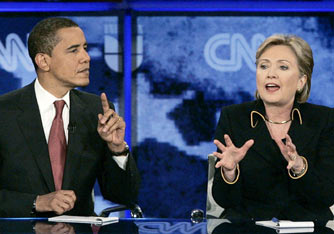Clinton dismisses suggestion that her campaign nearing end
Updated: 2008-02-23 10:15
NEW YORK - Hillary Rodham Clinton, struggling to regain ground ahead of must-win Democratic presidential nomination contests next month, denied that her conciliatory comments at the end of her debate with front-runner Barack Obama marked the beginning of the end of her candidacy.
Clinton also sought Friday to gain an edge in the Democratic race for the presidential nomination by selling her experience and touting herself as the only candidate with a comprehensive plan to end the housing crisis in the United States.
 |
| US Democratic presidential candidates, Senator Barack Obama (D-IL) and Senator Hillary Clinton (D-NY), participate in the Texas Democratic Party's presidential candidates debate at the University of Texas at Austin in Austin, Texas February 21, 2008. [Agencies] |
The Democratic debate between the two candidates was particularly important for Clinton going into March 4 primaries in Texas and Ohio, where polls show the two rivals in a very tight race.
The New York senator is in desperate need of a win after 11 consecutives losses sapped much of the momentum from her campaign and propelled Obama into the lead in the delegate count.
Meanwhile Friday, the White House sided with Republican John McCain and accused The New York Times of repeatedly trying to "drop a bombshell" on Republican US presidential nominees to undermine their candidacies. The newspaper has drawn fire from McCain and even some of his conservative critics for publishing a report Thursday suggesting that McCain had an improper relationship with a female lobbyist. McCain said the report was not true.
Clinton continued to press her theme of the economy, as the race heads into Midwestern states worried about tough times. Ohio, one of the next big states to vote, is home to millions of blue collar Democrats who Clinton's strategists believe are receptive to her populist economic pitch.
"We cannot jumpstart the economy without addressing the housing crisis," Clinton said in a statement Friday. "The fact that George Bush is starting to understand that reality but Senator Obama still does not should trouble all those concerned about how the housing crisis is impacting the economy."
In a marked departure from their previous heated exchanges, Thursday's Democratic debate in Austin, Texas, was largely cordial. But Clinton at one point drew boos from the crowd when she accused Obama of political plagiarism and ridiculed him as the candidate of "change you can Xerox." Her comment was a reference to Obama's use in his campaign speeches of words first uttered by his friend, Massachusetts Gov. Deval Patrick.
Obama dismissed the charge out of hand and turned the jeers to applause when he countered, "What we shouldn't be spending time doing is tearing each other down. We should be spending time lifting the country up."
Clinton quickly shifted her approach, and noted at the end of the debate that "no matter what happens in this contest, I am honored to be here with Barack Obama."
The remark was viewed by some Obama supporters as a concessional speech-of-sorts. But Clinton denied that Friday morning, saying in a round of television appearances, that they were as "a recognition that both of us are on the brink of historic change."
"I'm very proud that we have the two of us in this contest seeking the Democratic nomination, hoping to become our next president," she said on CBS's "The Early Show."
Obama's strong showing in recent primaries has made him the man to beat in a historic struggle between a black man and a white woman, and even former President Bill Clinton has said his wife must win both Ohio and Texas early next month to preserve her candidacy.
Obama has piled up the most victories in primaries and caucuses, giving him the overall lead in delegates, 1,362 to 1,266.5. Clinton's half delegate came from the global primary sponsored by the Democrats Abroad. It takes 2,025 delegates to claim the nomination at this summer's convention.
In the Republican race, White House deputy press secretary Scott Stanzel, declined to discuss the specifics of The New York Times story claiming McCain pushed legislation that would have benefited clients of lobbyist Vicki Iseman. Both McCain and Iseman have denied a romantic involvement.
Stanzel said the newspaper at times drops a "bombshell" on the Republican nominee over the course of a campaign and "sometimes they make incredible leaps to try to drop those bombshells on the Republican nominee."
In a statement Thursday, Times Executive Editor Bill Keller said, "We think the story speaks for itself."
The allegations contradict core themes of McCain's campaign: That he would bring honor and integrity to the White House as well as a record of changing business-as-usual Washington ways.
McCain said Friday that while lobbyists serve as close advisers to his presidential campaign, they are honorable and he is not influenced by corruption in the system.
McCain has already been focusing his campaign on the November general election. This week he was making campaign stops through Midwestern states likely to be pivotal in the fall.
Mike Huckabee is still running for the Republican nomination, but unlikely to catch up. McCain has 958 delegates to Huckabee's 254. It takes 1,191 delegates to win the Republican nomination.
|
|
|
||
|
||
|
|
|
|